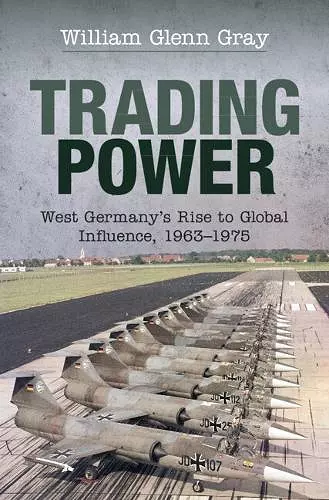Trading Power
West Germany's Rise to Global Influence, 1963–1975
Format:Hardback
Publisher:Cambridge University Press
Published:3rd Nov '22
Should be back in stock very soon
This hardback is available in another edition too:
- Paperback£25.99(9781108440752)

Highlights how West Germany leveraged its economic power to become a key pillar of the global order in the 1960s and 1970s.
Highlights how West Germany leveraged its economic power to become a key pillar of NATO, the European Community, and the global economy in the 1960s and 1970s; how it reduced Cold War tensions with the Soviet bloc; and how it renounced military status symbols such as nuclear weapons.Trading Power traces the successes and failures of a generation of German political leaders as the Bonn Republic emerged as a substantial force in European, Atlantic, and world affairs. Over the course of the 1960s and 1970s, West Germans relinquished many trappings of hard power, most notably nuclear weapons, and learned to leverage their economic power instead. Obsessed with stability and growth, Bonn governments battled inflation in ways that enhanced the international position of the Deutsche Mark while upending the international monetary system. Germany's remarkable export achievements exerted a strong hold on the Soviet bloc, forming the basis for a new Ostpolitik under Willy Brandt. Through much trial and error, the Federal Republic learned how to find a balance among key Western allies, and in the mid-1970s Helmut Schmidt ensured Germany's centrality to institutions such as the European Council and the G-7 – the newly emergent leadership structures of the West.
'Trading Power is the single best and most complete analysis of West Germany's rise to dominance in cold war Europe. Based on extraordinarily in-depth research, Gray skillfully and clearly tells the story of the diplomatic, political, and economic development of German power within the European community, the Atlantic alliance, and the international system. This history is essential to understanding Germany's significance in shaping the liberal world order and its changing position in today's Europe. It is a must-read for policymakers and students alike. A real triumph!' Thomas A. Schwartz, author of Henry Kissinger and American Power: A Political Biography
'This is a formidable book and one that promises to make an impact.' Nick Ostrum, Europe Now Journal
'The book is supported by sources and facts in the most pleasing way and resists the trend towards theorizing in cultural studies. It will be the benchmark for interpretations of West German foreign policy for a very long time, far beyond the narrower twelve-year period under study.' Jan-Otmar Hesse, H-Soz-Kult
'Readers will appreciate the intricate analysis of a unique foreign policy path facing multiple challenges from terrorism to the first oil shock. … Recommended.' G. P. de Syon, Choice
'Gray's style is always closely oriented to the sources, which enables him to innovatively capture some facets of Bonn's interwoven national politics and its orientation in the world. He does not shy away from clear, and above all critical, statements and labels, which are also fed by internal US or French sources. This makes the book a stimulating and innovative read. The reconstruction of the struggles of everyday political work in the cabinet and in major politics, sometimes supplemented by the eagle eye of global classification, represent the central achievements of an important volume.' Jost Dülffer, Sehepunkte
ISBN: 9781108424646
Dimensions: 235mm x 160mm x 33mm
Weight: 850g
475 pages